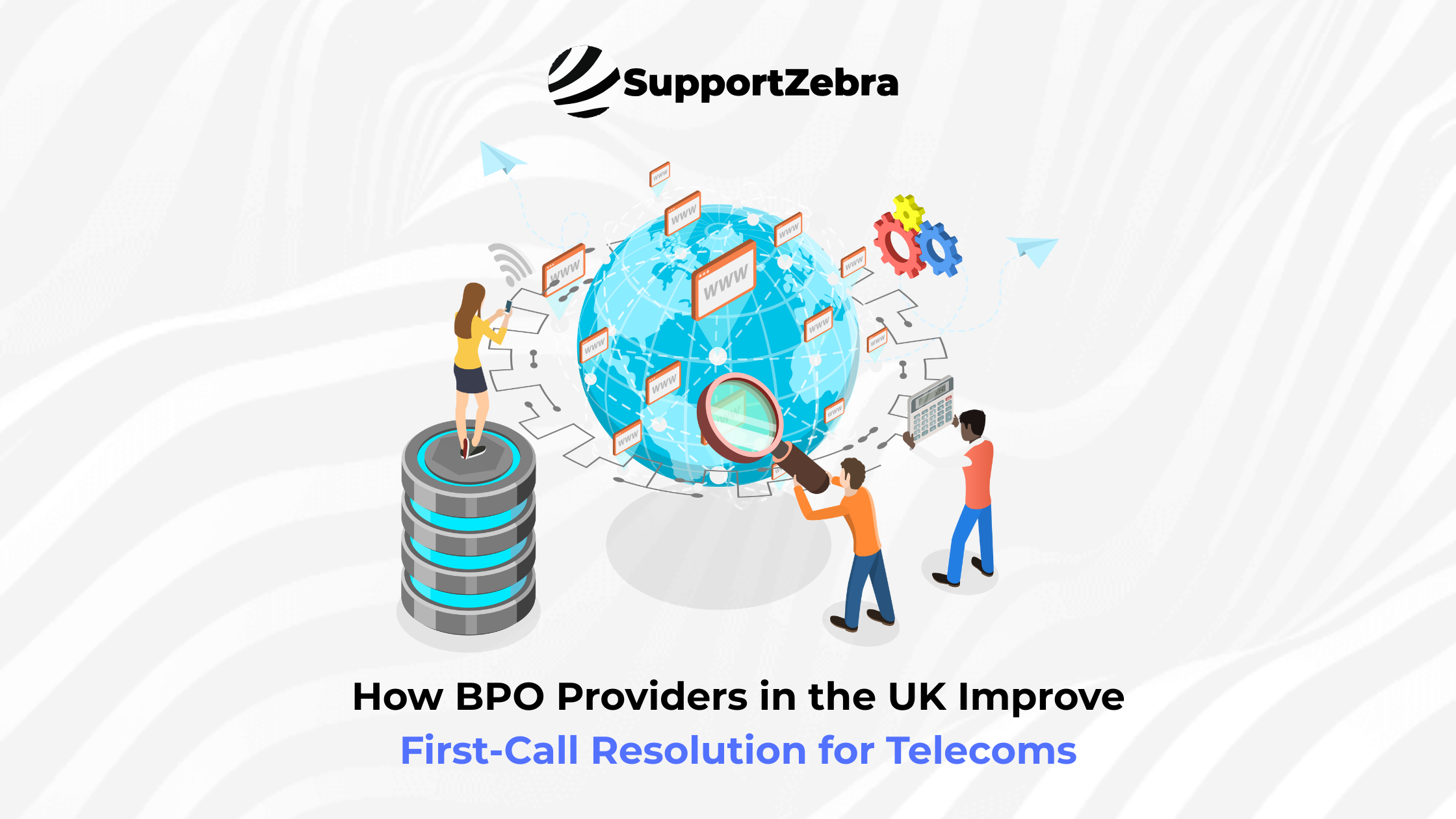First-Call Resolution Made Easy by UK BPO Providers
Key Takeaways:
- First-call resolution is the key to saving costs and keeping telecom customers loyal.
- UK BPO providers boost FCR through skilled training, smart tools, and clear processes.
- Strong FCR reduces repeat calls, escalations, and customer churn.
- SupportZebra delivers proven telecom outsourcing solutions that fix problems on the first call.
Frustrated customers. The same problems, call after call. Your team is swamped, and your customers are getting angry. This isn’t just annoying; it’s expensive. Every repeated call hemorrhages money and kills your reputation. This cycle will break your business if it doesn’t stop.
But there is a way out. Leading UK BPO providers have a proven framework to fix this for good. They turn your first call from a cost into a solution.
What Is First-Call Resolution and Why Does It Matter?
First-call resolution (FCR) is when a customer’s issue is solved in the very first contact. No repeat calls. No endless transfers. Just a quick fix.
For telecoms, this is vital because:
- Customers expect fast answers.
- Repeated calls create higher costs.
- Poor service leads to cancelled contracts.
When FCR is strong, customers stay loyal. They spend more. They recommend your service. High FCR is not just a call centre metric—it’s a business lifeline.

How Do BPO Providers in the UK Train Agents for Success?
Telecom issues are complex. A dropped signal, a billing dispute, or a failed installation can escalate quickly. Without the right training, agents panic or pass the problem on. UK BPO providers prevent this by building deep skills.
Their training often includes:
- Technical knowledge: Agents learn how networks, devices, and billing systems work.
- Problem-solving drills: Mock calls test how they handle tricky situations.
- Soft skills coaching: Active listening and empathy stop calls from spiralling.
With this approach, agents gain confidence. They don’t just answer calls—they fix them.
Why Is Technology a Game-Changer for FCR?
Even the best agent fails if the tools are broken. UK BPO providers arm their teams with smart technology. This makes it easier to resolve problems during the first call.
Examples include:
- Knowledge bases: Quick access to guides and scripts.
- Integrated CRM systems: Agents see the full customer history in seconds.
- AI support tools: Suggested answers pop up in real time.
- Call routing systems: Customers connect with the right agent on the first try.
When tech is seamless, agents don’t waste time searching. Customers get instant fixes, and frustration drops.
What Role Does Data Play in Improving First-Call Resolution?
Data is the secret weapon. UK BPO providers track every call and analyse what slows resolution down.
Key uses of data include:
- Spotting repeat issues from faulty devices or billing errors.
- Identifying knowledge gaps that need more agent training.
- Highlighting top performers who can mentor others.
- Predicting future issues through call patterns.
With these insights, providers adjust fast. They remove obstacles before they snowball. This makes every future call smoother.
How Do BPO Providers Manage Escalations?
Escalations are expensive. The longer a call bounces between departments, the more money is lost. UK BPO providers aim to stop this cycle.
They use clear escalation paths:
- Agents are trained to handle 80–90% of issues themselves.
- A small specialist team handles the rare complex cases.
- Escalations are logged and reviewed to prevent repeats.
This setup keeps most issues solved quickly. It also builds a stronger base of knowledge across the team.
Can Outsourced Teams Really Understand Telecom Customers?
Yes—when the provider invests in customer insight. UK BPO providers often partner with telecoms long-term. They study the customer base and learn what drives frustration.
They use:
- Customer surveys to understand pain points.
- Voice analytics to study tone and emotion.
- Focus groups to test communication strategies.
This knowledge is fed back into training. As a result, agents sound like they belong to the brand. They connect better and solve faster.
How Do UK BPO Providers Handle High Call Volumes?
Telecom call volumes spike often—during outages, new product launches, or billing periods. In-house teams usually can’t cope. UK BPO providers are built for this.
They handle spikes by:
- Scaling staff numbers up or down quickly.
- Using call deflection through chatbots or self-service portals.
- Prioritising urgent calls with advanced routing systems.
This flexibility keeps wait times short. More calls are answered. More first calls are resolved.

What Are the Cost Benefits of Higher FCR?
Every unresolved call has a cost. Multiple calls mean multiple hits to your budget. UK BPO providers prove that higher FCR is cheaper in the long run.
Benefits include:
- Fewer repeat calls: Lower staffing costs.
- Happier customers: Reduced churn and fewer refunds.
- Efficiency gains: Agents handle more unique cases instead of repeats.
- Brand strength: Better reputation attracts new customers.
In short, fixing the problem once is always cheaper than fixing it twice.
How Do BPO Providers Keep FCR High Over Time?
A one-time fix isn’t enough. UK BPO providers maintain high FCR with ongoing improvement.
They do this through:
- Regular refresher training.
- Constant updates to scripts and tools.
- Performance reviews with clear goals.
- Continuous data monitoring and feedback loops.
This focus means they don’t just hit targets once. They keep performance strong year after year.
Why Choose SupportZebra for Telecom Outsourcing?
SupportZebra takes first-call resolution seriously. We understand that every repeat call costs money and risks loyalty. Our approach combines skilled agents, smart technology, and constant data insight to deliver better results for telecom companies.
With SupportZebra, you gain:
- Agents trained for telecom complexity.
- Advanced systems that speed up problem-solving.
- Scalable teams for high call volumes.
- Proven strategies to boost FCR and cut costs.
We don’t just answer calls—we fix problems the first time. That’s the SupportZebra difference.

